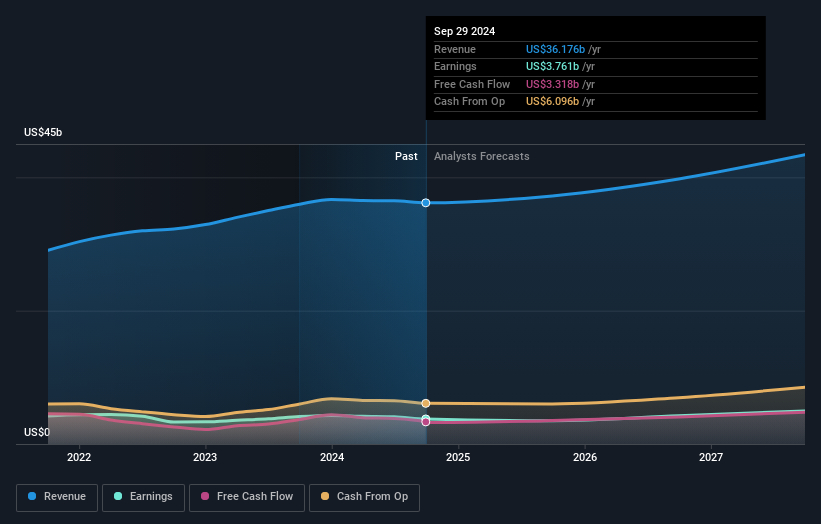- United States
- /
- Hospitality
- /
- NasdaqGS:SBUX
An excellent week for Starbucks Corporation's (NASDAQ:SBUX) institutional owners who own 78% as one-year returns inch higher

Key Insights
- Given the large stake in the stock by institutions, Starbucks' stock price might be vulnerable to their trading decisions
- 50% of the business is held by the top 25 shareholders
- Ownership research along with analyst forecasts data help provide a good understanding of opportunities in a stock
If you want to know who really controls Starbucks Corporation (NASDAQ:SBUX), then you'll have to look at the makeup of its share registry. The group holding the most number of shares in the company, around 78% to be precise, is institutions. In other words, the group stands to gain the most (or lose the most) from their investment into the company.
And things are looking up for institutional investors after the company gained US$4.0b in market cap last week. The one-year return on investment is currently 8.6% and last week's gain would have been more than welcomed.
Let's take a closer look to see what the different types of shareholders can tell us about Starbucks.
Check out our latest analysis for Starbucks

What Does The Institutional Ownership Tell Us About Starbucks?
Many institutions measure their performance against an index that approximates the local market. So they usually pay more attention to companies that are included in major indices.
Starbucks already has institutions on the share registry. Indeed, they own a respectable stake in the company. This suggests some credibility amongst professional investors. But we can't rely on that fact alone since institutions make bad investments sometimes, just like everyone does. It is not uncommon to see a big share price drop if two large institutional investors try to sell out of a stock at the same time. So it is worth checking the past earnings trajectory of Starbucks, (below). Of course, keep in mind that there are other factors to consider, too.

Institutional investors own over 50% of the company, so together than can probably strongly influence board decisions. We note that hedge funds don't have a meaningful investment in Starbucks. The Vanguard Group, Inc. is currently the largest shareholder, with 9.7% of shares outstanding. BlackRock, Inc. is the second largest shareholder owning 6.8% of common stock, and Capital Research and Management Company holds about 5.2% of the company stock.
A closer look at our ownership figures suggests that the top 25 shareholders have a combined ownership of 50% implying that no single shareholder has a majority.
While it makes sense to study institutional ownership data for a company, it also makes sense to study analyst sentiments to know which way the wind is blowing. Quite a few analysts cover the stock, so you could look into forecast growth quite easily.
Insider Ownership Of Starbucks
While the precise definition of an insider can be subjective, almost everyone considers board members to be insiders. Company management run the business, but the CEO will answer to the board, even if he or she is a member of it.
Insider ownership is positive when it signals leadership are thinking like the true owners of the company. However, high insider ownership can also give immense power to a small group within the company. This can be negative in some circumstances.
Our most recent data indicates that insiders own some shares in Starbucks Corporation. The insiders have a meaningful stake worth US$2.2b. It is good to see this level of investment. You can check here to see if those insiders have been buying recently.
General Public Ownership
With a 19% ownership, the general public, mostly comprising of individual investors, have some degree of sway over Starbucks. While this group can't necessarily call the shots, it can certainly have a real influence on how the company is run.
Next Steps:
While it is well worth considering the different groups that own a company, there are other factors that are even more important. Consider for instance, the ever-present spectre of investment risk. We've identified 2 warning signs with Starbucks (at least 1 which doesn't sit too well with us) , and understanding them should be part of your investment process.
If you would prefer discover what analysts are predicting in terms of future growth, do not miss this free report on analyst forecasts.
NB: Figures in this article are calculated using data from the last twelve months, which refer to the 12-month period ending on the last date of the month the financial statement is dated. This may not be consistent with full year annual report figures.
If you're looking to trade Starbucks, open an account with the lowest-cost platform trusted by professionals, Interactive Brokers.
With clients in over 200 countries and territories, and access to 160 markets, IBKR lets you trade stocks, options, futures, forex, bonds and funds from a single integrated account.
Enjoy no hidden fees, no account minimums, and FX conversion rates as low as 0.03%, far better than what most brokers offer.
Sponsored ContentNew: Manage All Your Stock Portfolios in One Place
We've created the ultimate portfolio companion for stock investors, and it's free.
• Connect an unlimited number of Portfolios and see your total in one currency
• Be alerted to new Warning Signs or Risks via email or mobile
• Track the Fair Value of your stocks
Have feedback on this article? Concerned about the content? Get in touch with us directly. Alternatively, email editorial-team (at) simplywallst.com.
This article by Simply Wall St is general in nature. We provide commentary based on historical data and analyst forecasts only using an unbiased methodology and our articles are not intended to be financial advice. It does not constitute a recommendation to buy or sell any stock, and does not take account of your objectives, or your financial situation. We aim to bring you long-term focused analysis driven by fundamental data. Note that our analysis may not factor in the latest price-sensitive company announcements or qualitative material. Simply Wall St has no position in any stocks mentioned.
About NasdaqGS:SBUX
Starbucks
Operates as a roaster, marketer, and retailer of coffee worldwide.
Average dividend payer and fair value.
Similar Companies
Market Insights
Community Narratives




